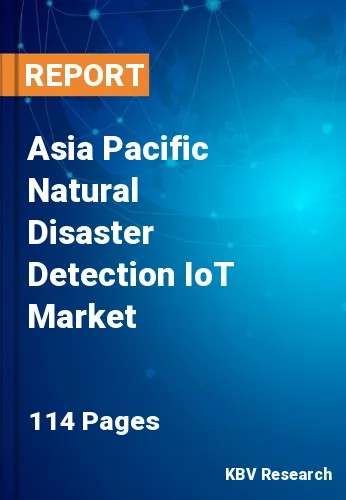The Asia Pacific Natural Disaster Detection IoT Market would witness market growth of 36.6% CAGR during the forecast period (2022-2028).
A major factor in the rise in the frequency and length of power outages during the past several years has been the severity of floods, earthquakes, wildfires, ice storms, and other extreme weather events. In a couple of moments, city systems are rendered ineffective. Cellular coverage might suddenly become sparse, and outages can continue from day to month. When a town's essential infrastructure systems are in peril, the consequences of a natural disaster may become more severe for the inhabitants of that community.
As a result, natural disaster detection systems based on IoT have grown in demand to prevent adverse impacts of disasters on human life and infrastructure. Leaders can communicate with vulnerable groups like nursing homes, hospitals, and mental health institutions by utilizing satellite-based Internet of Things messaging systems. When cellular coverage is poor, satellite systems can provide continuous access to send brief bursts of data, such as status updates or the location of an asset, without being compromised by bad weather or natural disasters.
The Asia Pacific region has been hit by the greatest number of natural catastrophes over the previous three decades. Additionally, the region will experience a significant rise in the amount of water stress over the next two decades. Flooding poses the greatest risk to 13 countries in the region, which has a high hazard profile overall. Although no country in the region faces more than three ecological hazards, the ETR classifies the region's countries as a moderate risk group. In this region, floods and storms are responsible for over 60% of all-natural disasters. Therefore, the natural disaster detection IoT market will experience a surge in growth as more governments enable IoT development in this region.
The China market dominated the Asia Pacific Natural Disaster Detection IoT Market by Country in 2021, and would continue to be a dominant market till 2028; thereby, achieving a market value of $180.7 million by 2028. The Japan market is estimated to grow a CAGR of 35.8% during (2022 - 2028). Additionally, The India market would experience a CAGR of 37.4% during (2022 - 2028).
Based on Component, the market is segmented into Solutions, Hardware and Services. Based on Solutions Type, the market is segmented into Early Warning System & Floating Sensor Network, Lightning Detector System & Acoustic Real-Time Monitoring System and Beacons & Others. Based on Application, the market is segmented into Flood Detection, Wildfire Detection, Weather Monitoring, Earthquake Detection, Landslide Detection and Others. Based on Communication System, the market is segmented into Satellite-Assisted Equipment, First Responder Tools, Vehicle-Ready Gateways and Emergency Response Radars. Based on End User, the market is segmented into Government Organizations, Law Enforcement Agencies, Private Companies and Rescue Personnel. Based on countries, the market is segmented into China, Japan, India, South Korea, Singapore, Malaysia, and Rest of Asia Pacific.
Free Valuable Insights: The Worldwide Natural Disaster Detection IoT Market is Projected to reach USD 2.6 Billion by 2028, at a CAGR of 35.3%
The market research report covers the analysis of key stake holders of the market. Key companies profiled in the report include SAP SE, NEC Corporation, BlackBerry Limited, Semtech Corporation, OnSolve LLC, One Concern, Inc., OgoXe, Sadeem Technology and Earth Networks, Inc. (Advanced Environmental Monitoring LLC).
By Component
By Application
By Communication System
By End User
By Country
Our team of dedicated experts can provide you with attractive expansion opportunities for your business.

